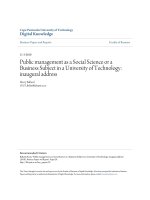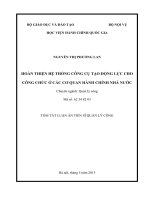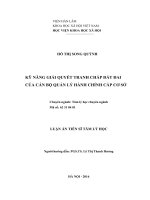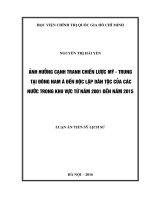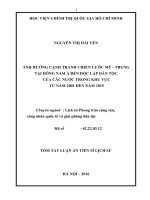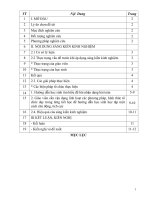Public management as a social science or a business subject in a luận án tiến sỹ của tác giã nước ngoài liên quan đến đề tài về kiểm toán
Bạn đang xem bản rút gọn của tài liệu. Xem và tải ngay bản đầy đủ của tài liệu tại đây (992.62 KB, 25 trang )
Cape Peninsula University of Technology
Digital Knowledge
Business Papers and Reports Faculty of Business
11-3-2010
Public management as a Social Science or a
Business Subject in a University of Technology:
inaugural address
Harry Ballard
CPUT,
This Text is brought to you for free and open access by the Faculty of Business at Digital Knowledge. It has been accepted for inclusion in Business
Papers and Reports by an authorized administrator of Digital Knowledge. For more information, please contact
Recommended Citation
Ballard, Harry, "Public management as a Social Science or a Business Subject in a University of Technology: inaugural address"
(2010). Business Papers and Reports. Paper 29.
/>INAUGURAL PROFESSORIAL ADDRESS
Professor Harry Ballard
Public Management as a Social Science or a Business Subject
in a University of TechnologyINAUGURAL PROFESSORIAL ADDRESS
by Professor Harry Ballard
Contents
Citation 2
Published Works 4
Inaugural Lecture 8
Public Management as a
Social Science or a Business Subject
in a University Of Technology
arry Ballard is the Head of Department of Public Management in the Faculty of Business. During a previous work tenure, at the
City of Cape Town and Bellville Municipality, he attained a BA degree from the University of South Africa with Psychology and
Private Law as his majors. He decided to continue his studies in the legal discipline and obtained the BIuris degree from the
University of South Africa. He continued his work career in local government and attained his Honours and Master’s degrees in
Public Administration from the University of Stellenbosch.
In his capacity as Head of Committee Services at the former Bellville City Council he became interested in public policy and decision-making
and attempted in his PhD research to propose a model for more effective decision-making at local government level. A mixed research
methodology was adopted and the Department of Mathematics and Statistics at the University of Cape Town collaborated in this study.
The outcome stimulated much academic debate and controversy just post 1994. The PhD degree in Public and Development Management
was awarded in 1996 by the University of Stellenbosch. The thesis was entitled “Effective decision-making in a large local authority”. He
continued his research and in 1998 a second Master’s degree on International Relations was conferred by the Political Sciences Department
at the University of Stellenbosch, at a time when South Africa was being welcomed back in the international community and affected by
the trends and influences of globalization and internationalization. The latter two postgraduate degrees were attained whilst employed at
the former Peninsula Technikon.
After sixteen years of continued service in local government, Ballard was employed by Deloitte and Touche in 1991 as a management
consultant and was actively involved in various consultancy/advisory projects in all three spheres of government. The most notable project
was the feasibility study conducted in the South Africa Naval Dockyards in Simonstown which included the streamlining of the operations
function within the dockyard, the rationalisation of redundant assets, space utilisation and reviewing the maintenance plans of the old
Daphne class submarines.
In January 1993 Ballard commenced duties at the former Peninsula Technikon, as a contract lecturer in the Law Department responsible
for the administration and presentation of the public management academic programme, which at that time was the National Diploma and
Advanced Diploma. The Public Management academic programme now includes the postgraduate qualifications of Master’s degree and
H
Citation of Professor Harry Ballard
2
Doctorate in Technology. The department has developed into an autonomous, inter-dependent entity with a personnel complement of
thirteen members.
During his years at the Cape Peninsula University of Technology, Ballard has been employed in various posts from contract lecturer, lecturer,
senior lecturer to his current position of Head of Department, to which he was promoted in July 1999. From July 1998 to December 2006
he served first as Research Co-ordinator and then as acting Research Co-ordinator for the Faculty of Business with the mandate to initiate,
develop, promote and facilitate research amongst academics and students for degree and non-degree purposes.
The Council on Higher Education has contracted him periodically as a Programme Evaluator for graduate and post-graduate academic
programmes in the following academic disciplines, namely Marketing Management, Management, and Programme and Project Management,
programmes which have been submitted for accreditation.
Ballard has presented a number of local and international academic papers and has published in various accredited journals. He has
successfully completed two National Research Foundation funded projects as well as a research project for the Western Cape Provincial
Government. He presents training regularly to the three spheres of government and public sector bodies as well as the private sector.
Ballard has successfully supervised nineteen Master’s degree candidates in the Public Management and Business Administration disciplines
and has also successfully supervised two Doctorates in Technology candidates in the Public Management. Appointed Associate Professor
in September 2008 Ballard is chairperson of the Faculty Co-operative Education Committee and the Faculty Structures Committee.
Ballard has also been active in the business sector as an entrepreneur in the capacity of partner, member and director in the retail,
manufacturing and restaurant industries, respectively.
Finally, Ballard has played first team club rugby for five seasons and is a silver medalist for the Comrades marathon and Two Oceans ultra
marathon. He has completed eleven Two Oceans ultra marathons, ten Two Oceans half marathons and sixteen Cape Argus cycle tours.
3
PUBLICATIONS IN ACCREDITED JOURNALS
1. Ballard, HH. Schwella, E. South African local government
decision-making: systems perspective, SAIPA, Vol 31, No 1,
March 1996.
2. Ballard, HH. Schwella, E. Decision-making in local
government: theoretical perspectives. POLITIKON, Vol 23,
No 2, December 1996.
3. Ballard, HH. Schwella, E. Impact of globalization on local
government in South Africa. Development Southern Africa
Journal, Vol 17, No 5, December 2000.
4. Pick, B. Ballard, HH. Scope and extent of home-based
business income relative to employment earnings in financing
household expenditures: A study undertaken in sub-economic
housing area within the Cape Metropole. Development
Southern Africa, Vol 22, No 3, September 2005.
5. Reid, E. Ballard, HH. Impact of monetary as a form of land
restitution on the current lifestyles of certain Paarl residents.
Administratio Publica, Vol 14, No 1, July 2006.
6. Norton, I. Ballard, HH. Quality assurance framework for small
manufacturing companies in the clothing industry in the Cape
Metropolitan area, South Africa. International Journal for
Clothing Science and Technology, January 2008.
7. Ballard, HH. Implication of a single public service initiative:
a local government perspective. Administratio Publica,
Vol 17, Issue 3, 11-24, 2009.
8. Morton-Achmad, D. Ballard, HH, Steyn, E. Bayat, MS. A
normative model for the employment of people with disabilities
within the Provincial Government of the Western Cape.
Administratio Publica, Vol 17, Issue 2, 73 -103, 2009.
9. Iling, LH. Ballard, HH. A community-based approach for the
operation and maintenance of shared basic water and sanitation
services in informal settlements within the municipal jurisdiction
of the City of Cape Town. Administratio Publica, Vol 18,
Issue 1, 85-105, 2010.
Published Works
4
COMPLETED RESEARCH PROJECTS
1. Awarded a research grant from the previous Centre for Scientific
Development to undertake research to Assess the training
and development needs for local government in the Northern
Cape Province and to propose possible training strategies.
2. Received a National Research Foundation (NRF) research
grant to conduct research on the Human resources
requirements within the textile industry in the Western Cape
and to project levels and competencies to the year 2005.
This included all the technological sectors as well as
management levels.
3. Submitted a research report to the provincial government of
the Western Cape (PGWC), Department of Community Safety
to identify and define criteria (local and international) for the
design, establishment and location of police stations in the
urban and rural areas of the Western Cape.
ACADEMIC PAPERS PRESENTED
(LOCAL AND INTERNATIONAL)
1. Presented paper on the Status of Public Management teaching
in South Africa to the Indian Institute of Management,
Ahmabedabad, India in March 1995.
2. Presented paper on Training and education as a strategy for
self-governance and autonomy for outlying communities
against the background of the local government restructuring
process to the Atlantis Education Forum, Atlantis in April 1995.
3. Presented paper on Competencies: A practical approach to
public sector training to the National Business Initiative
Workshop on transforming training in the public sector held
in Midrand, Johannesburg in March 1996.
4. Presented paper at the World Association for Co-operative
Education international conference entitled Impact on
globalization on co-operative education within the sphere of
local government training and education, held at the Cape
Technikon in August 1997.
5
5. Presented paper to the Cape Town Metropolitan Council
Workshop on civil society entitled Civil society and local
government, held at Wale Street in September 1997.
6. Presented paper to the Public Administration Forum for
Historically Disadvantaged Institutions entitled Public
administration curriculum development: practical approach
at Bellville Inn, Bellville, in July 1998.
7. Presented paper at the first Technikon SA Biennial Exploration
conference on the new millennium perspectives, opportunities
and challenges entitled Transforming local government financial
management and administration training for the new millennium
held at Conference Centre, Johannesburg in October 1998.
8. Paper presented to the Faculty of Management Sciences,
Mangosuthu Technikon, Umlazi, Kwa Zulu-Natal entitled Impact
of globalization on South African local government held on
25 – 26 August 1999.
9. Paper presented at the Winelands Conference, University of
Stellenbosch on the Assessment of performance management
for outcomes-based delivery: Criteria and instruments held at
the University of Stellenbosch from 12 – 14 September 2001.
10. Paper presented at the Institute of Municipal Finance Officers
Conference (IMFO) on the Development of a long-term financial
strategy for a municipality held at the Velodrome, Bellville,
Cape Town from 8 – 10 October 2002.
11. Paper presented at the Tabeisa International Conference on
Higher Education and Economic Regeneration entitled
Improving the sustainability of small, medium and micro
enterprises through improved delivery of retail banking and
advisory services held at Peninsula Technikon, Bellville, South
Africa from 30 October – 1 November 2002.
12. Paper presented at the annual Institute of Municipal Finance
Officers (IMFO) conference on shaping local government for
the 21
st
century entitled The role of the audit activities within
an organisation held at the Cape International Convention
Centre, Cape Town from 15 – 17 August 2005.
13. Co-presented a paper at SAIMAS, 16
th
International Conference
entitled Performance in local government: Quo Vadis held at
Aventura Resort, Bela-Bela from 23 – 25 August 2006.
6
14. Co-presented a paper at the 6
th
AGSE International
Entrepreneurship Research Exchange conference entitled An
analysis of SMME practices in the Western Cape, South Africa
held at the University of Adelaide, Adelaide, South Australia
from 3 – 6 February 2009.
15. Co-presented a paper at the 2009 Annual Conference of
ASSADPAM entitled Mentorship: Connecting theory and
practice – action learning case-study – Revenue Department,
Municipality of the City of Cape Town, South Africa held in
Stellenbosch from 10 – 11 September 2009.
16. Co-presented a paper at the 10
th
Annual Conference of the
South African Association of Public Administration and
Management (SAAPAM) entitled Employee perception of public
sector compliance with corporate governance principles: Case
of the Western Cape Department of Cultural Affairs and Sport,
South Africa held in Port Elizabeth from 7 – 9 October 2009.
17. Co-presented a paper at the 2010 Annual Conference of
ASSADPAM entitled Contradiction between public sector
human resources demands and supply restrictions with
reference to a selected university of technology held in Pretoria
from 27 – 29 September 2010.
7
INTRODUCTION
A lasting debate still prevails regarding the focus and locus of public
management as an academic discipline and whether it should be
registered and presented as an academic qualification within the
standard qualification programme and qualification mix (PQM) of a
University of Technology. The question has become increasingly
more contemporary with the directive that as from January 2009 all
new qualification programmes will have to meet the requirements
of the new Higher Education Qualification Framework (HEQF) as
published in October 2007.
The purpose of this address is not to deepen or add to the debate
but to attempt to clarify and contextualize the development of the
discipline and sketch its present status from a global and local
perspective especially with regard to the development of the discipline
in Universities of Technology. A further attempt will be made to
correlate the performance of government with the teaching of public
management to assess the effectiveness of public management
teaching and research and thereby question the content and need
for the qualification. Finally, my address will examine the role and
contribution of the Department of Public Management to this
university of technology and propose a new approach.
DEVELOPMENT OF PUBLIC MANAGEMENT AS AN
ACADEMIC DISCIPLINE
Heywood (2002) states that scholars such as Aristotle had written
about the actual and ideal role of politics and government. Heywood
(2002) further states that Socrates, Plato and Aristotle were not
concerned with identifying “politics” and “government” in society
and human affairs. Political science therefore, did not emerge as a
distinct discipline and academic subject until the late 19
th
century.
Heywood (2002) further cites Auguste Comte
(1830-1842), a French philosopher who argued that human society
could be studied in terms of verifiable empirically based descriptive
laws and with the same methods as utilized by natural scientists.
Social science was thus born.
Rakoczy (2010) explains social science as a scholastic discipline
that investigates human society and examines the individual’s
relationship with and interaction in society – based on observation
and subjective explanation.
Rakoczy (2010) further lists the following generally accepted types
of social sciences:
Public Management as a Social Science or a
Business Subject in a University of Technology
8
anthropology;
economics;
history;
political science which includes how governments
influence society;
psychology;
sociology;
education;
geography;
law;
linguistics; and
archeology.
Public administration rather than public management is a generally
accepted global term or reference, however, in South Africa,
government studies and research is referred to as public management,
so as to avoid the narrow definition of “administration” and rather
emphasise the holistic approach to the study and research of
government matters. In this address reference will be made to public
administration which is the international trend.
Various definitions of public administration have been submitted but
Kernaghan (2010) who claims that “… public administration has no
generally accepted definition…” because the scope of the discipline
is so great and so debatable that it is easier to explain than define.
Kernaghan (2010) further states that public administration is a field
of study, that it is a discipline and an occupation. Kernaghan (2010)
concedes that disagreement exists as to whether the study of public
administration can be called a discipline, largely because it is often
viewed as a subfield of the two disciplines of political science and
administrative science.
Historically, Woodrow Wilson is considered the father of public
administration. Wilson (1887) first formally recognized public
administration in an 1887 article entitled “The Study of Administration.”
Wilson (1887) wrote that “… it is the objective of administrative
study to discover. First, what government can properly and
successfully do, and, secondly, how it can do these proper things
with the utmost possible efficiency and at the least possible cost
either of money or energy.” Woodrow Wilson then became the
President of the United States of America from 1913 to 1921.
Wilson (1887) advocated four concepts, namely:
separation of politics and administration;
comparative analysis of political and private organizations;
improving efficiency with business-like practices and attitudes
towards daily operations; and
improving the effectiveness of public service through management
and by training civil servants and merit-based assessment.
9
INTERNATIONAL DEVELOPMENT OF THE DISCIPLINE
The separation of politics and administration plays a significant role
in public administration today, as indicated above. In the 1940’s this
dichotomy was challenged by scholars such as Luther Gulick and
Lyndall Urwick (1937). Gulick (1937) developed a comprehensive,
generic theory of organization and emphasized the scientific method,
efficiency, professionalism, structural reform and executive control.
Gulick summarized the duties of administrators with the acronym:
POSDCORB, which stands for planning, organizing, staffing, directing,
co-ordinating, reporting and budgeting. Fayol (1949) developed a
systematic, 14 point, treatment of private management. A single,
generic management theory integrating the public and private sector
was thought to be possible. The proposed general theory could be
focused on governmental organisations.
The above theorists were challenged in the period between World
War II to the 1970’s due to the Vietnam War and Watergate scandal.
A call was made for efficient administration to replace ineffective,
wasteful bureaucracy. Public administration would thus have to
remain separate from politics so that it would remain effective.
In the late 1980’s a new paradigm was proposed by Osborne and
Gaebler (1992) referred to as the New Public Management which
advocated the use of private sector innovations, resources and
organization ideas to improve the public sector. Osborne (1992) wrote
and motivated for an entrepreneurial public administration. The new
public management paradigm was defined as a combination of splitting
large bureaucracies into smaller more fragmented ones, competition
between different public agencies and between public agencies and
private firms as well as incentives on more economic lines
The arguments against the New Public Management concept is
based on the premise that people are viewed as economic units
not as democratic participants. The model is still widely accepted
at all levels of government and in many Organisation for Economic
Co-operation and Development (OECD) nations. The emphasis
was on managerialism rather than governance.
In the late 1990’s Denhardt and Denhardt (2000) proposed a new
public service model in response to the domination of the New
Public Management. The successor to the new Public Management
model was the digital era governance which focused on themes
such as; reintegrating government responsibilities, needs-based
holism (executing activities in a cursive manner) and exploiting
transformational capabilities of modern IT and digital storage. An
10
additional new public model propagated by Aucoin (1990) is the
New Public
Governance, an approach which opposes the centralization of
power, role and influence of partisan political staff, personal-
politicisation of appointments to the senior public service and the
assumption that the public service is promiscuously partisan to the
government of the day.
In view of the foregoing developments, the following core knowledge
areas have been identified in a selected and typical public
administration discipline, commonly referred to as “pillars” by Shafritz
and Hyde (2007).
human resource management which includes all the functions of
a basic human resources system, namely recruitment and selection,
training and development, employee benefits, employee health
care and compensation;
organizational theory which includes the design of organizations
in terms of structured functional units, delegated powers, levels
of authority and decision-making, identification of roles and
activities and responsibilities;
ethics which includes the principles of governance and codes
of conduct;
policy design, development, implementation, monitoring, evaluation
and analysis which is underpinned by an empirical approach;
public finance and budgeting which includes all the functions of
a financial system such as income, expenditure, budgeting, internal
and external controls, costing, cash management and supply
chain management.
In 2008 the Minnowbrook III conference was held at the Syracuse
University’s Minnowbrook Conference Centre in the United States
of America. The Minnowbrook III was a follow-up to the two previous
Minnowbrook conferences held in 1968 and 1988 referred to as
Minnowbrook I and II respectively. The general theme of these
conferences was to redefine public administration and theory building,
especially in relation to the changing environment. The Minnowbrook
III consisted of two phases, Phase I consisted of summaries of
concerns and future directions representing a number of areas,
such as inter alia law, politics and public administration management.
The outcome of Phase I was presented to the attendees of Phase
II which was further discussed and debated. The debate continues.
11
DEVELOPMENT OF PUBLIC ADMINISTRATION AS
AN ACADEMIC DISCIPLINE IN UNIVERSITIES OF
TECHNOLOGY FROM 1993
The selected period coincides with my appointment as an academic
lecturer in public management at the former Peninsula Technikon.
Pre-1993 the study, teaching and research conducted within the
discipline of public administration was in terms of a closed and
generic functional model as propagated by Cloete (1981) in his work
entitled “Introduction to Public Administration” in which he presented
six generic functions, namely, policy, organizing, financing, staffing,
procedure and control.
Schwella (1985) criticized the above model and proposed a holistic
approach to the study, teaching and research in public administration
based on the open systems model and contended that the macro
and intermediate environment in which the public sector operated
had to be included within this analysis. Schwella (1985) proposed
that the discipline be referred to as Public Administration and
Management.
Furthermore, the Mount Grace Conference in 1991, referred to as
Mount Grace I, re-examined the public administration discipline and
was of the view that the discipline was too descriptive, thus lacking
sufficient analytical, explanatory and predictive techniques. The
Mount Grace recommendations and Schwella’s work influenced the
recurriculation of public administration academic programmes within
the previous technikon fraternity and certain universities in South
Africa. The programme designation was registered with the National
Department of Education and referred to as Public Management
and Administration.
Development Administration also evolved as an independent
academic subject within the Public Administration discipline in the
former technikons, which was in accordance with the international
trend and which was further formalized by section 195(1)(c) of the
Republic of South Africa Constitution Act of 1996 which prescribed
that “public administration must be development-oriented.”
Development Administration was subsequently included in the
aforementioned re-curriculated academic programme as an elective
subject.
In 1999 a follow-up Mount Grace conference was convened to re-
evaluate the discipline post 1994, Mount Grace II (Schwella & Theron
(2000)) as there was a drastic shift in focus. The South African
society had moved from apartheid racial and ethnic discrimination
12
to a more egalitarian, non-discriminatory society. At the same time,
cognizance was also taken of the development context in South
Africa, as the following characteristics of a development state were
prevailing, as formulated by Singh (1986):
low levels of living standards;
low levels of productivity;
high population and dependency burdens;
high and rising levels of unemployment;
dependence on agricultural production and primary product
exports; and
dominance, dependence and vulnerability international relations.
A new re-curriculation process was undertaken and completed
under the convenorship of the former Technikon SA and a new
qualification was re-curriculated, approved and registered as Public
Management in 1999/2000. Development Administration as an
academic discipline was not included in this new qualification. The
new qualification mix consisted of traditional pure
management/business subjects which supported the three traditional
pillars of public policy, public human resources management and
public financial management.
CURRENT STATUS AND RELEVANCE OF
PUBLIC MANAGEMENT
The current status and relevance of public management teaching
and research within South African traditional universities,
comprehensive universities and universities of technology is subject
to robust debate. The content of the public management academic
programmes is also subject to critique, especially from the National
Department of Public Service and Administration. The Minister for
Public Service and Administration in his key note address to
Association of Southern African Schools and Departments of Public
Administration and Management (ASSADPAM) on 27 September
2010 referred to the long and extended debate on public
administration as a discipline which has been recently revived in
international debates such as the Commonwealth Association of
Public Administration and Management (CAPAM) and the International
Association of Schools and Institutes of Administration ((IASIA). The
Minister for Public Service and Administration, Baloyi (2010) pleaded
for a development focused public administration which placed a
strong emphasis on citizen values, participation and needs.
Cloete (2010) refers to the Mount Grace II deliberation which regarded
public administration as too fragmentary, as arbitrary boundaries
13
existed within Public Administration/Management and between
Public Administration and Development Administration.
Based on the foregoing Cloete (2010) further reviewed the Mount
Grace II (1999) report and presented his finding on education and
training at the same ASSADPAM conference and detailed the
following factors which influenced curriculum design and which are
still applicable to-day, inter alia:
emerging new theoretical models, value systems and
best practices;
changing nature of governance and the blurring of boundaries
between state, private sector and community/civil society;
internationalization of governance as a result of globalization;
computerization of society and new technologies;
narrowing gap between education and training, as well as between
residential and distance education and training in particular.
Cloete (2010) further revisited the Mount Grace II resolutions on
research and presented his views on the future of Public Administration
research in South Africa which are listed hereunder, inter alia:
more original research required;
more critical, analytical research required;
more empirical data assessments linked to theory required;
more multi-disciplinary and applied problem-solving research
foci needed;
more rigorous methodology required;
more international research exposure required; and
structured masters programmes neglect research
capacity-building.
In addition to the foregoing, Baloyi (2010) expressed the concerns
of government with regard to the quality and relevance of teaching
and research in public administration. Baloyi (2010) refers to the
figures published by the Department of Higher Education and Training
which reflect an increased trend in public administration enrolments.
Baloyi (2010) applied the 32% formula for graduate unemployment,
which revealed that 698 graduates were unemployed in 2006 despite
the high vacancy rates in government. Baloyi (2010) concludes that
higher education institutions and government training institutions
are not entirely meeting the needs of government or society in the
teaching of public administration.
The preliminary research, undertaken by Maree (2010) at a selected
department of public administration at a University of Technology
in the Western Cape supports the foregoing. Maree (2010) conducted
a demand analysis on a random sample of vacant advertised posts,
which were published in national and regional newspapers as well
as government circulars. The following aspects were reviewed:
14
positions/designations in the discipline and scope of work
from junior to senior level;
competencies attached to the post;
generic skills and graduate attributes;
qualifications required; and
years of relevant experience.
The interim findings of the above analysis revealed the following:
generally, no Public Management qualification were required;
junior positions often required a National Diploma or Bachelors
degree in Public Management;
senior positions often required a bachelor degree in the Social
Sciences field;
majority of positions required a bachelors degree in finance or
human resources (specialist appointments);
minimum number of posts at senior management level required
post graduate qualifications, but when required only in
specialist areas.
Whether the status as sketched above has an impact on government
performance is examined briefly below.
CORRELATION BETWEEN PUBLIC MANAGEMENT
TEACHING AND RESEARCH AND GOVERNMENT
PERFORMANCE
Any attempt to determine the effectiveness of Public Management
training, education and research will be premised on the assumption
that the greater the appropriateness of the content of the academic
qualification, the greater the performance of government in meeting
societal needs.
In order to test this assumption the following observations are made.
Baloyi (2010) concedes that the 2009 Development Indicators
released by the Presidency have not been achieved and that
government performed poorly. Baloyi (2010) reported on the following
trends to support the foregoing:
unemployment had increased;
water was scarce and wasted through poor management of
sanitation and infrastructure;
average life expectancy was declining;
education outcomes are poor;
safety and security was limited; and
continued protests from communities over poor service delivery,
corruption and inadequate provision.
15
In addition, Reddy (2010) reported at the ASSADPAM conference
on 28 September 2010 that 279 municipalities of the established
284 municipalities within South Africa had either received qualified
audit reports or disclaimers from the Auditor-general. Reddy (2010)
further reported that the services of 29 Municipal Managers were
either suspended or terminated for non-performance and that the
services of a further ten (10) Chief Financial Officers were terminated.
To further emphasise the dearth of municipal management
competencies the Weekend Argus on 9 October 2010 reported
that municipalities in South Africa were in debt for R1.5 billion
for water.
Furthermore, 403 sewage plant facilities could not be assessed so
as to ascertain whether they are dysfunctional.
In view of the foregoing, it may be concluded that a contradiction
exists between public sector human resources demands for the
effective provision of services and supply by institutions in higher
education to meet this demand. Other restrictions may exist other
than the incorrect content or epistemology, which should be the
focus of further debate and research, such as appropriate qualified
lecturers and trainers, correct profile of student intake, strict application
of admission criteria, suitable facilities, appropriate teaching
methodologies and methods and finally, the ability of the academics
to transfer knowledge, skills and attitude effectively.
CONTRIBUTION BY THE PUBLIC MANAGEMENT
DEPARTMENT TO CAPE PENINSULA UNIVERSITY
OF TECHNOLOGY
Although the contribution towards effective government service
delivery is being questioned, the department’s contribution to this
university has been significant.
The first thirty full-time students for Public Management were
registered in 1992 under the leadership of Mr Awie Sadie. Since
then there had been a phenomenal increase in student enrolments.
Since mid-1995 the total number of students enrolled for any
academic year, including part-time students fluctuated between 900
and 1200.
Presently the combined figure for both campuses is 1 072. Fifty-
two M Tech and D Tech students are registered and active.
The personnel profile of 11 academics includes five (5) PhD’s or D
Tech’s and five (5) Masters degrees or M Tech’s.
All the senior academics within the department have extensive
practical or industry related experience. The research profile
has taken momentum with a number of articles published in
accredited journals or are being submitted for publication. In
16
this academic year four members will present papers at four
different international conferences.
The business profile is also impressive. For the 2006 and 2007
financial years the department generated a total combined campus
income of R31 910 247 and R34 273 075 respectively. (Ballard:2010).
The total direct and other expenses for the same periods are R2
153 487 and R7 779 143 respectively.
WAY FORWARD
The international history and development of public administration
as well as the local development of the discipline in Universities of
Technology in particular, provides a thorough and tested normative
and theoretical foundation to propose a new approach.
Two questions are thus posed. Firstly, what is the core discipline
which underpins public management? – is it politics, economics,
management or science and secondly, what should the content be?
In the attempt to approach the two questions it will be deemed
necessary to explain the locus and context for the presentation of
the qualification, namely the University of Technology. Du Pré (2009)
states that Universities of Technology should have management,
science and engineering as the top priority. Du Pré'8e (2009) further
cites Brook (2000) who provides the following set of characteristics
of a typical University of Technology:
research informed;
curriculum developed around the graduate profiles defined
by industry and professions;
focus on strategic research, applied research into
professional practice;
multi-level entry and exit points for students;
concerned with professional/vocational education; and
technological capabilities as important as cognitive skills.
Bourgon (2009) attempts to explain the core discipline of public
administration by proposing a generalist approach, by stating that
public administration emerged from law and political science with
the emphasis on compliance. Bourgon (2009) further proposes that
public administration borrowed from business management to
improve performance which included economics and public choice
and that finally, it was enriched by social science and organizational
development theories. Bourgon’s (2009) explanation is too generalist
and not specific for consideration and application, especially in the
South African current situation and need, as it relates to development.
17
My response to each of the two questions are presented hereunder.
Firstly, the core discipline which should underpin public management
should be policy studies and governance, which relates to
development. The core discipline is contemporary as it relates to
the constitutional requirements for development and the prevailing
macro social and economic trends prevailing in South Africa. The
governance component to include the constitutional and public law
framework, as well as ethics. The reference to management should
therefore be avoided, which will thus provide perspective and
direction to the appropriate content of the qualification.
Secondly, management business subjects should be excluded, for
example, financial management and accounting, project and
programme management, human resources management,
information management, information technology, organizational
development and behaviour and communication. The aforementioned
subjects are presented by the appropriate specialist academic
programmes located elsewhere in the business/management
sciences faculties from where government can source and appoint.
The proposed arrangement will comply with the characteristics
attached to Universities of Technologies, such as cross-field and
multi academic presentations. The content of the academic
qualification to support the core principle, will be inter alia, all the
components relating to political studies and analysis, (which includes
statistics) public economics, constitutional, public and administrative
law, economic and social development, ethics, public
communication/participation and the principles of government. All
the components listed could be recurriculated into a complete self-
serving programme up to the fourth year level.
The qualification will have an empirical basis relating to the real
needs and shortcomings detailed in this address.
Whether public management is a social science or a business
subject has been empirically approached and treated from a qualitative
perspective. The proposed new discipline should not be presented
in a business or management faculty (perhaps in the Faculty of
Education and Social Sciences) and should be presented as a social
science to improve government’s inter action and service to society.
REFERENCES
Aucoin, Peter. 1990. Comment: assessing managerial reform.
Governance 3 (2): 197 – 204. 1996. The new public management:
Canada in comparative perspective. Ottawa: Institute for Research
on Public Policy.
Ballard, HH. 2008. Structures, Resources and Processes:
Discussion document. Unpublished document presented to the
Faculty of Business, Cape Peninsula University of Technology at
Caledon, 7 – 10 February 2010.
18
Baloyi, MR. 2010. Key note address to the 2010 Association of
Southern African Schools and Departments of Public Administration
and Management (ASSADPAM) conference, Irene,
Pretoria, 27 – 29 September 2010.
Bourgon, J. 2009. New Directions in Public Administration: Serving
beyond the predictable, Public Policy and Administration,
24, 309 – 329.
Cloete, F. 2010. Evaluating Developmental state impact on
empowerment in South Africa. Unpublished paper presented at
the 2010 ASSADPAM conference, Irene,
Pretoria, 27 – 29 September 2010.
Cloete, JJN. 1977. Public Administration and Management.
Pretoria. Van Schaik.
Cloete, JJN. 1981. Introduction to Public Administration.
Pretoria. Van Schaik.
Cloete, JJN. 1988. Public Administration and Management.
Pretoria. Van Schaik.
Cloete, JJN. 1991. Public Administration and Management.
Pretoria. Van Schaik.
Cloete, JJN. 1998. South African Public Administration and
Management. Pretoria. Van Schaik.
Denhardt, Robert, and Denhardt, Janet. 2000. “The New Public
Service,” Public Administration Review, 60(6), 549-559.
Du Pré, R. 2009. The place and role of universities of technology
in South Africa, South African Technology Network, Bloemfontein,
Durban University of Technikon.
Fayol, H. 1949. General and Industrial Management. (translated
by Storrs, C), Sir Isaac Pitman & Sons, London.
Gulick, Luther Halsey, and Urwick, Lyndall, F. eds. 1937. Papers
on the Science of Administration. New York, Institute of Public
Administration.
Gulick & Urwick. 1937. Administrative Development and
Organisational theory. Columbia University Press, New York.
Heywood, Andrew. 2002. Politics. 2
th
Edition. Palgrave Foundations.
New York.
Wilson.W. 1887. The Study of Administration, Political Science
Quarterly 2.
Kernaghan, Kenneth. “Public Administration” in the Canadian
Encyclopedia online at
(accessed on 7 October 2010).
19
Maree, M. Ballard, HH. Contradiction between public sector human
resources demands and supply restrictions with reference to a
selected university of technology. Unpublished paper presented at
2010 Annual Conference of ASSADPAM, Irene, Pretoria,
27 – 29 September 2010.
Mount Grace Resolution. 1991. A resolution taken at the Mount
Grace Conference on the state of Public Administration discipline
in South Africa. 26 November 1991. South Africa, Magaliesberg.
Osborne, D. Gaebler, TA. 1992. Reinventing Government: How
the Entrepreneurial Spirit is Transforming the Public Sector, Addison-
Wesley: Reading.
Reddy, R. 2010. Doing more with less the Shared Services way
– Lessons for municipalities in South Africa. Unpublished paper
presented at 2010 Annual Conference of ASSADPAM, Irene, Pretoria,
27 – 29 September 2010.
Republic of South Africa Constitution Act, 1996. Pretoria,
Government Printers.
Rokoczy, C. Definition of Social Science. Online article at
http//www.yourdictionary.com/refence/word-definitions/define-social-
science.html (accessed on 7 October 2010).
Singh, K. 1986. Rural Development: Principles and Policies and
Management. New Delhi: SAGE Publications.
Schwella, E. 1985. Public Administration or Public Management
– Another perspective, or, why not Public Administration and Public
Management? SAIPA. Journal of Public Administration.
Schwella, E. Theron, F. 2000. The state of public and development
management. The Mount Grace II Papers. Stellenbosch: School
of Public Management and Planning.
Shafritz, JM, and Hyde, AC. 2007. The Classics of Public
Administration. 6
th
Edition. Boston Thompson. Wadsworth.
Weekend Argus. Municipal debt for water hits R1 billion. Published
in the Weekend Argus, Saturday edition, dated 9 October 2010.
Wilson, W. 1887. The Study of Administration. Political Science
Quarterly 2. June 1887.
20
